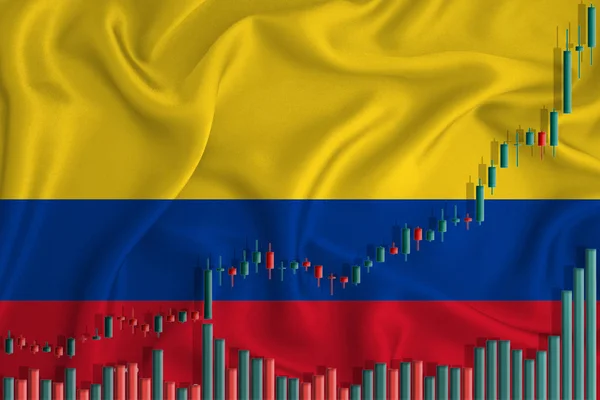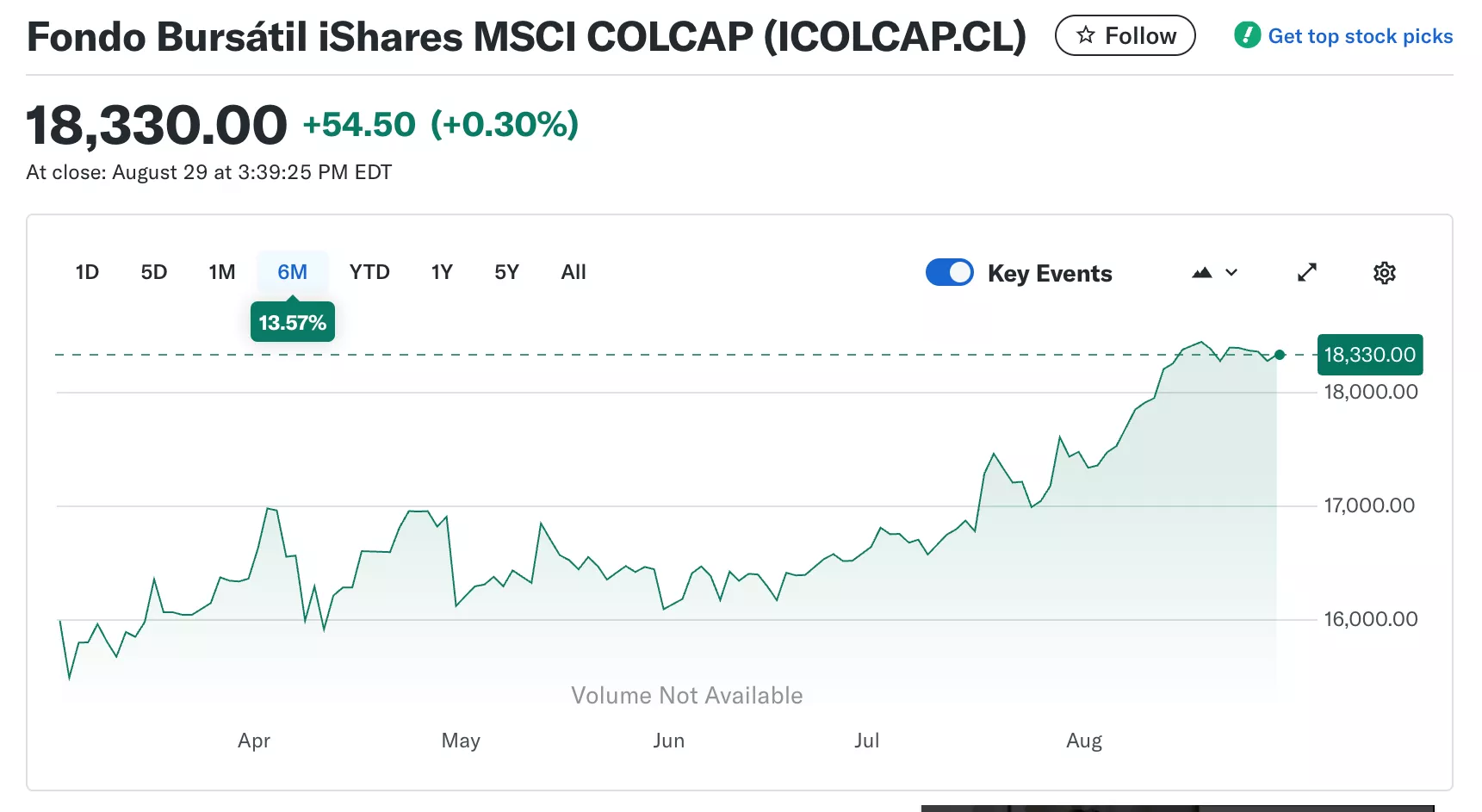Hold On Colombia ETF As Closer Trade Deals With China Could Have Impact On Economy

Image Source: DepositPhotos
The iShares COLCAP ETF (ICOLCAP), a part of BlackRock, looks to track the investment results of an equity index with exposure to Colombia. The ETF is up 13.57% over the past 6 months, and is nearing all-time highs.
For the Colombia ETF, we recommend a Hold due to escalating tensions between Colombian President Petro and U.S. President Trump since both of their elections.
If diplomatic relations continue to further break down, it’s likely to have a marked impact on the ETF's performance. For instance, petroleum is Colombia’s most valuable resource, contributing more than $13 billion to its economy in 2023. With $4.65B of the sales, the U.S. is by far the single largest buyer of this export. Energy company Ecopetrol is also one of the ETF's largest holdings.
A historical reliance on the U.S. as a primary trading partner means that the Colombian economy could be negatively impacted if primary sources of income are disrupted by current affairs.
Aside from trade, the two countries have been aligned on policy and anti-narcotic strategies for decades with Colombia acting as a strategically influential South American ally.
An erosion of this partnership has a serious risk and could destabilize not only Colombia but the region after decades of progress. Due to this risk and ICOLCAP's near all-time price, we have a Hold recommendation on the ETF.

The breakdown of diplomatic relations between Trump and Petro
On August 7, 2022 the 34th president of Colombia, Gustavo Petro, was inaugurated, marking the first time a left-wing president was elected in the country’s history. Since then, Colombia’s relations with Washington have grown increasingly tense. Petro’s administration has clashed with officials over human rights and migration enforcement, among other issues, in a highly public manner.
The two heads of state began locking horns in January of this year, when Petro denied entry to two U.S. military planes carrying deported Colombians. A furious response from President Trump followed, including threatening a 25% tariff on Colombian imports. Bogotá attempted to retaliate but quickly backed down.
Yet the barbs continue. In August Trump included Colombia’s capital Bogota among “the worst places in the world” in a statement.
Unfortunately, the most recent events suggest that these clashes have already started to have real-world consequences. This month Petro spoke out on a potential U.S. military strike against neighboring Venezuela that could drag his country toward a regional conflict, with a reinforcement of Venezuelan troops and U.S. military deployment in the Southern Caribbean.
According to The New York Times, President Trump has secretly signed a directive to the Pentagon to begin using military force against certain Latin American drug cartels that his administration has deemed terrorist organizations. Colombian Foreign Minister Rosa Villavicencio believes that the United States has no real intention of launching a military operation against Venezuela, despite the escalation of tensions.
Even so, the volatile triangle of tensions among Washington, Caracas, and Bogotá means that tension is increasing.
ICOLCAP is the largest Colombian equity fund in the world. The ETF's 5 largest holdings are financial services company GRUPO CIBEST PREF SA (21.19%), financial services company GRUPO CIBEST SA (14.10%), public service company INTERCONEXION ELECTRICA SA (8.95%), energy company ECOPETROL SA (8.70%) and public service company GRUPO ENERGIA BOGOTA SA (7.59%).
Petro explores closer trade ties with China through the BRI
As a response to Trump and new U.S policy, Petro has been looking to closer relationships with China. During a visit to Beijing this year, an intent to join China’s Belt and Road Initiative (BRI) was signed. The BRI is a global infrastructure and investment initiative that critics say expands Beijing’s influence at the expense of Western allies.
Closer ties with China will likely pave the way for major investments in roads, ports, railways and digital networks, although there is concern about the impact of these projects and the debt they could generate for the nation.
The BRI signing represents a dramatic pivot from Petro—one that could reshape Colombia’s foreign relations for years to come.
According to data from Colombia's central bank, the country took in around $14 billion USD in foreign direct investment (FDI) in 2024, which was down from $16.7 billion the year prior.
In Colombia’s capital of Bogotá, the U.S. remained the largest source of FDI, responsible for 28.6% of all projects. This is followed by Spain and Mexico.
If diplomatic ties between Colombia and the U.S. break down further, we could expect foreign investment from the Western Hemisphere to continue to falter. This fell last year to levels not seen since 2020, during the Covid-19 pandemic crisis.
While the U.S. is far from the only global ally that Colombia can look to, it is a fact that the U.S. has represented a major and steadfast partner for decades, in addition to being a driver for tourism in the economy. Further, according to data from the Ministry of Commerce, Industry, and Tourism, the U.S. continues to be the primary source of foreign visitors to Colombia, accounting for 27.1% of international arrivals.
The tourism sector contributed $15.5 billion USD, representing 4.8% of the country’s GDP. This made tourism the second-largest generator of foreign exchange, surpassing traditional export sectors like coffee, flowers, and bananas.
Should this source of foreign investment dry up, it could mean a material negative impact for Colombian industries and traded companies. Companies in the tourism industry, including online travel agency Despegar Colombia SAS, Price Res SAS and Aviatur Colombia DMC have no doubt felt the impact of this.
Repercussions on the business community
According to Javier Díaz, president of the foreign trade association Analdex, on President Petro and the signing of the Belt and Road Initiative, “we believe that, in the current situation of global trade crisis and tariff war between the United States and China, this announcement is inappropriate.”
Added the executive, the country has not analyzed the risks and opportunities this move represents. For example, China is not a market economy, and this could cause great damage to Colombia's export relations and trade defense mechanisms. Furthermore, the announcement could be "an irritant to the United States," Díaz added.
Even prior to the presidential visit to China, public-private agency Invest in Bogotá warned that a global contraction in software and IT investment could impact some sectors negatively. To stay ahead, the agency had mapped out 120 advanced-stage investment opportunities, which could generate over 16,000 jobs in the coming years.
These potential projects are estimated to range from $3.4 million USD to $12.6 million USD each on average, and were focused on healthcare and corporate services, which are more likely to be impacted by the U.S. and its relationship with Colombia.
When it comes to AI innovation, Colombia has emerged as a leading force for the region, championing strong governance and the adoption of ethical regulatory frameworks. This commitment to democratic AI adoption is set to be the theme of TECH SPHERE 2025, an initiative from Source Meridian. Tech ventures like 360 Health Data are also leveraging AI and international collaboration.
Colombia’s largest companies may be impacted as well. For instance, less than 2 years ago TerraPay, a global payments network and Bancolombia, Colombia’s largest bank in terms of assets, signed a contract to maximize the entry of money into Colombia from the U.S.
For the country’s largest airline, it was only 15 months ago that Avianca successfully emerged from Chapter 11 bankruptcy. Six months ago, the airline opened tickets for its new Dallas-Bogotá direct route and last month announced routes to Tampa and Fort Lauderdale.
Colombia has long been one of the closest allies to the U.S. in the region, working together through economic agreements and anti-narcotics strategies. We expect this strong relationship to continue.
At the same time, with the near all-time high of the ETF, and the holdings of ICOLCAP.CL being impacted by international trade and investment, we have a Hold recommendation on the Colombia ETF.



